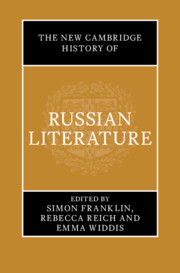Book contents
- The New Cambridge History of Russian Literature
- The New Cambridge History of Russian Literature
- Copyright page
- Contents
- Figures
- Contributors
- Acknowledgements
- On Transliteration, Names, and Dates
- Introduction
- History 1 Movements
- History 2 Mechanisms
- 2.1 The Monastery
- 2.2 The Court
- 2.3 The Salon and the Circle
- 2.4 The Thick Journal
- 2.5 The Publisher
- 2.6 Queerness
- 2.7 The Censor
- 2.8 The Voice
- 2.9 The Self-Publisher
- 2.10 The Market
- 2.11 The Internet
- 2.12 Empire
- Boxes 3 Places
- Boxes 4 Narrative Voices
- History 3 Forms
- History 4 Heroes
- Index
- References
2.2 - The Court
from History 2 - Mechanisms
Published online by Cambridge University Press: 31 December 2024
- The New Cambridge History of Russian Literature
- The New Cambridge History of Russian Literature
- Copyright page
- Contents
- Figures
- Contributors
- Acknowledgements
- On Transliteration, Names, and Dates
- Introduction
- History 1 Movements
- History 2 Mechanisms
- 2.1 The Monastery
- 2.2 The Court
- 2.3 The Salon and the Circle
- 2.4 The Thick Journal
- 2.5 The Publisher
- 2.6 Queerness
- 2.7 The Censor
- 2.8 The Voice
- 2.9 The Self-Publisher
- 2.10 The Market
- 2.11 The Internet
- 2.12 Empire
- Boxes 3 Places
- Boxes 4 Narrative Voices
- History 3 Forms
- History 4 Heroes
- Index
- References
Summary
Throughout the imperial period, but especially in the eighteenth century, the Russian imperial court held a quasi-monopoly on the production, circulation, and conservation of literary artefacts. As the dominant political and economic force in the Russian Empire, it was able to introduce a new type of public sphere by shaping the social mission of literary texts and dictating the norms according to which literature was to be created and judged. This chapter focuses on the reign of Catherine II in order to show how the court promoted social engineering through literature, in particular through the genres of panegyric poetry and neoclassical drama. Celebrated authors in turn benefited from the court’s support. As a result, the imperial palace combined political and aesthetic functions: it introduced a new ceremonial culture and deployed princely patronage to glorify the court’s policies and to impose an absolutist social and aesthetic order.
Keywords
- Type
- Chapter
- Information
- The New Cambridge History of Russian Literature , pp. 241 - 257Publisher: Cambridge University PressPrint publication year: 2024

